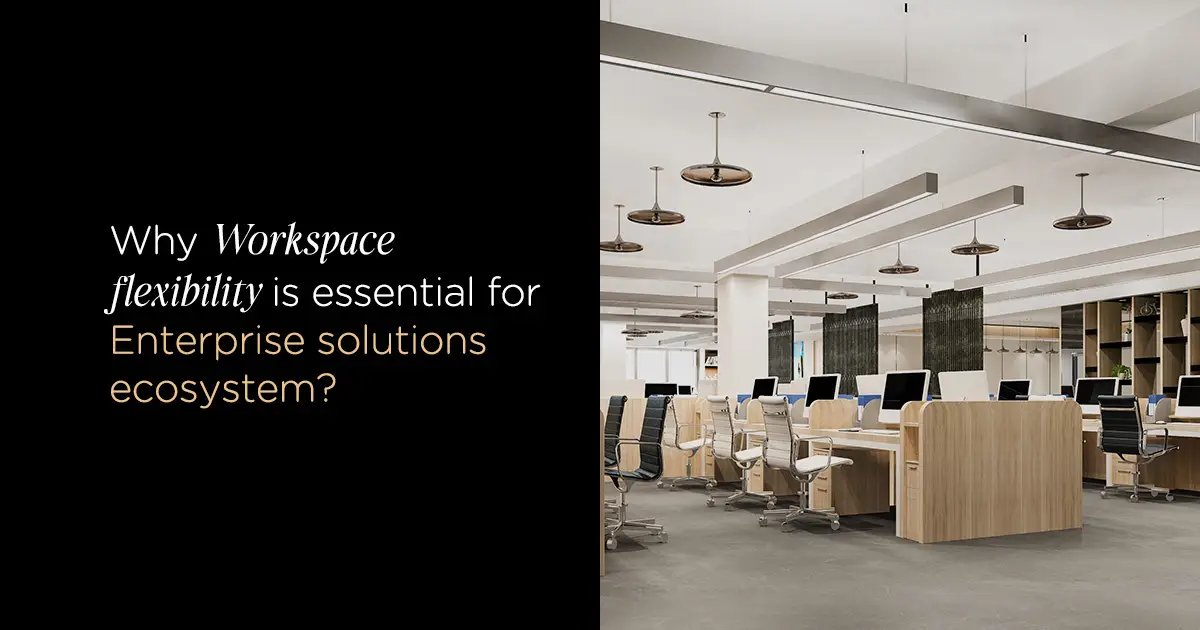
July 30, 2025
Why Workspace Flexibility is Essential for Enterprise Solutions Ecosystem
Enterprise organisations are changing how they approach workspace requirements as business needs become more dynamic, and employee expectations evolve. Workspace flexibility is now part of corporate real estate planning, with a 2024 Unispace report finding that 87% of employees and 95% of employers in India are satisfied with hybrid work arrangements, exceeding global averages.
This shift affects not only where employees work but also how companies design their office spaces, manage teams, and deliver enterprise solutions. Flexible workspace arrangements now influence everything from technology infrastructure to collaborative practices. According to research, 85% of businesses report higher productivity after introducing flexible work policies, which makes flexibility a necessary part of how large organisations operate rather than just a workplace benefit.
Adapting to Changing Work Styles
Modern work patterns have changed significantly from traditional office-based models. Companies now support multiple work styles within single organisations, requiring workspace solutions that can accommodate different approaches to productivity and collaboration. Enterprise teams now operate through various work arrangements:
- Hybrid schedules: Employees split time between home offices and corporate locations on rotating schedules
- Remote-first operations: Teams work primarily from distributed locations with occasional office visits
- Project-based presence: Staff members come to offices for specific collaborative work or client meetings
- Flexible hours: Employees work during non-traditional hours, requiring 24/7 office access capabilities
- Cross-functional collaboration: Teams from different departments need shared spaces for temporary projects
Companies must provide workspace options that support these different styles simultaneously. This requires office designs that can be reconfigured quickly, technology systems that work across locations, and policies that allow employees to choose appropriate work environments based on task requirements.
Meeting Employee Expectations and Enhancing Talent Acquisition/Retention
Employee expectations about workplace flexibility have changed permanently. Companies that cannot provide flexible work options face challenges in recruiting and retaining skilled professionals. Current employee expectations include:
- Choice in work location: Ability to work from home, office, or alternative locations based on personal needs
- Flexible scheduling: Options to adjust work hours around personal commitments and peak productivity times
- Professional home office support: Equipment, technology, and resources needed for effective remote work
- Collaboration tools: Technology platforms that enable seamless communication regardless of location
- Career development opportunities: Access to training, mentoring, and advancement regardless of work location
Companies report that flexible work policies have become essential for talent competition. Organisations without flexible options struggle to attract candidates who have become accustomed to workplace autonomy. Employee retention improves when companies provide workspace choices that accommodate personal circumstances and work preferences.
Cost Optimisation and Financial Agility
Flexible coworking space strategies provide enterprises with significant cost management advantages. Companies can adjust real estate expenses based on actual usage rather than maintaining fixed overhead for underutilised space. Companies achieve cost optimisation by:
- Reduced real estate footprint: Less physical office space is needed when employees work remotely or on hybrid schedules
- Variable expense models: Costs adjust based on actual space usage rather than fixed lease commitments
- Shared resource utilisation: Meeting rooms, equipment, and facilities are used more efficiently across teams
- Lower facilities costs: Reduced utilities, cleaning, security, and maintenance expenses for smaller office spaces
- Flexible lease arrangements: Shorter-term commitments that can be adjusted based on business needs
This cost reduction allows enterprises to invest resources in technology, talent, and business development rather than fixed real estate expenses.
Driving Innovation and Collaboration
Flexible workspaces can improve innovation and collaboration when designed properly. Companies create environments that bring together diverse teams while providing spaces for focused individual work. Innovation benefits from workspace flexibility in several ways:
- Cross-functional interaction: Flexible spaces allow teams from different departments to work together on projects
- Diverse perspective integration: Remote and in-office employees contribute different viewpoints to problem-solving
- Rapid prototyping environments: Spaces can be reconfigured quickly to support different types of creative work
- Client collaboration spaces: Flexible meeting areas that can accommodate external partners and customers
- Informal networking opportunities: Casual interaction spaces that encourage spontaneous idea-sharing
Collaboration improves when employees can choose work environments that match their communication needs. Some tasks require face-to-face interaction, while others benefit from quiet, focused environments. Flexible workspace design provides options for both scenarios.
The Role of Flexibility in Enterprise Culture
Workspace flexibility influences company culture by demonstrating trust in employees and supporting work-life integration. Organisations that provide flexible options often see improvements in employee engagement and productivity. Cultural benefits include:
- Increased employee autonomy: Workers feel trusted to manage their productivity and schedule
- Better work-life integration: Employees can balance personal and professional commitments more effectively
- Results-focused evaluation: Performance measured by output rather than time spent in the office
- Inclusive practices: Accommodates employees with different personal circumstances and needs
- Adaptability mindset: Company culture becomes more responsive to change and employee feedback
Companies with flexible workspace policies often report stronger employee loyalty and higher job satisfaction scores. This cultural shift supports long-term business success by creating a more engaged and committed workforce.
The Importance of Flexible Office Spaces
Physical office design plays a crucial role in supporting flexible work arrangements. Modern offices function as collaboration hubs rather than individual workstations, requiring different space allocation and design approaches. Effective flexible office spaces include:
- Variety of work zones: Different areas optimised for focused work, collaboration, meetings, and social interaction
- Reconfigurable furniture: Modular systems that can be adjusted based on team size and project requirements
- Technology integration: Seamless connectivity between in-office and remote workers through video conferencing and collaboration tools
- Booking systems: Digital platforms that allow employees to reserve spaces based on their daily needs
- Quiet zones: Areas designed for concentrated work without interruption
- Social spaces: Informal areas that encourage networking and casual interaction
Office space utilisation becomes more efficient when employees can choose appropriate environments for different types of work. This approach maximises the value of physical real estate while supporting diverse work styles.
Benefits of Flexibility for Enterprise Solutions
Flexible workspace arrangements provide specific advantages for enterprise solution delivery and management. Companies can respond more quickly to client needs and market changes when their workforce operates with greater agility. Enterprise solution benefits include:
- Faster project deployment: Teams can be assembled quickly from distributed talent pools
- 24/7 support capabilities: Global teams provide continuous service coverage across time zones
- Scalable resource allocation: Staff can be added or reduced based on project requirements without office space constraints
- Client proximity advantages: Employees can work closer to client locations when needed
- Reduced travel costs: Remote collaboration reduces the need for business travel while maintaining client relationships
- Disaster recovery capabilities: A distributed workforce provides business continuity during emergencies
- Access to global talent: Companies can hire skilled professionals regardless of geographic location
These benefits enable enterprise organisations to deliver solutions more efficiently while maintaining a high quality of service. Flexible workspace strategies support business agility and competitive advantage in rapidly changing markets.
Conclusion
Workspace flexibility has become essential for enterprise success as business requirements and employee expectations continue to evolve. Companies that provide flexible work options benefit from reduced costs, improved talent retention, increased innovation, and better client service capabilities. The shift requires careful planning of physical spaces, technology systems, and management practices to support diverse work styles effectively. Organisations that successfully implement flexible workspace strategies position themselves for long-term success by creating more adaptable, efficient, and employee-focused operations. This approach enables enterprises to respond quickly to market changes while maintaining productivity and service quality across distributed teams.




